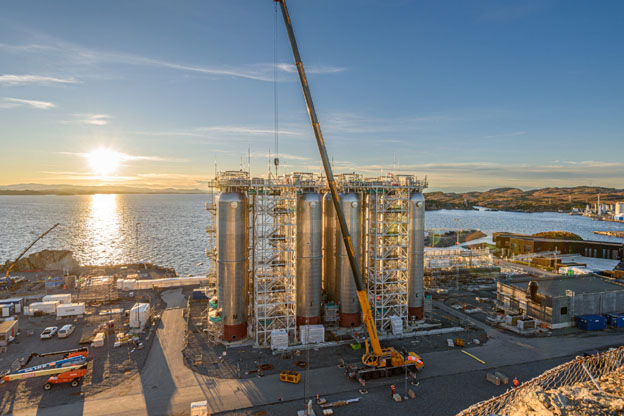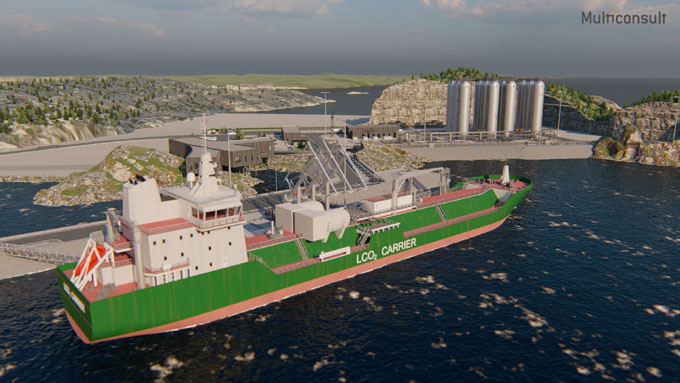
- Northern Lights will increase its CO2 storage capacity to more than 5 Mt per year
- Northern Lights signed a commercial agreement with Stockholm Exergi for transport and storage of 900 kt CO2/y, from 2028
- First CO2 storage from Phase 1 of the project is expected this summer
TotalEnergies and its partners, Equinor and Shell, have announced the Final Investment Decision (FID) of the second phase of the Northern Lights development, which will increase the project transport and storage capacity from 1.5 million to more than 5 million tons of CO2 per year from 2028.
The first phase of Northern Lights is completed and ready to receive CO2 from industrial emitters. Operations are expected to start this summer, with the first CO2 transportation by ship from Heidelberg Materials’ cement factory in Brevik, Norway and its injection and permanent storage into a reservoir 2,600 meters below the seabed, off the coast of Øygarden, western Norway.
The second phase announced today represents an investment of NOK 7.5 billion (~$700 million) and leverages existing onshore and offshore infrastructures. This expansion includes new onshore storage tanks, pumps, a jetty, injection wells and transport vessels - which are all expected to be completed for a start-up by the second half of 2028.
This FID of this second phase follows the signing of a 15-year commercial agreement between Northern Lights and the Swedish district energy provider, Stockholm Exergi, for the cross-border transport and storage of 900,000 tons of biogenic CO2 emissions annually, starting in 2028. Stockholm Exergi is the 5th company to commit with Northern Lights for transport and storage of its CO2 emissions, after Heidelberg Materials and Celsio in Norway, Yara in the Netherlands and Ørsted in Denmark. In addition, Northern Lights is in advanced discussions with several large European industrial customers to market the remaining storage capacity.
“I am delighted of the launch of Northern Lights phase 2, which represents a significant step forward for the CCS industry. Northern Lights can thus provide a concrete solution for the hard-to-abate industrial emitters in Europe, so that they can reduce their CO2 emissions and thereby secure their businesses’ sustainability”, said Nicolas Terraz, President Exploration & Production of TotalEnergies.
“The decision to expand our CO2 transport and storage services represents the next step in building a commercially viable CCS market in Europe. It confirms Northern Lights’ commitment to offer an effective solution for companies to reduce emissions. The investment decision is an important milestone for our company, our customers and industry partners, governments and regulators. We have jointly been working hard to establish the CCS chain and make a real difference enabling Europe to achieve climate targets”, said Tim Heijn, Managing director of Northern Lights JV.

Northern Lights JV is a Joint Venture owned by TotalEnergies, Equinor and Shell and is the transportation and storage component of the full carbon capture and storage (CCS) value chain initiative by the Norwegian state called “Longship”. The project's first phase will be completed in mid-2024, with an initial capacity of up to 1.5 million tonnes of CO2 per year. The Northern Lights infrastructure is open to third parties and will deliver carbon transport and storage solutions as a service. Northern Lights holds Exploitation License 001, the first license for CO2 injection and storage in subsea reservoirs on the Norwegian Continental Shelf.
Background
Northern Lights enables the mitigation of industrial process emissions for which there is currently no scalable solution, accelerates the decarbonisation of European industry, and facilitates the removal of CO2 from the atmosphere.
Accelerating decarbonisation
Northern Lights are developing an open and flexible infrastructure to transport CO2 from capture sites by ship to a terminal in western Norway for intermediate storage, before being transported by pipeline for permanent storage in a reservoir 2,600 metres under the seabed.
Transport and storage facilities will offer safe and permanent underground storage to industries from across Europe.
The project is the transport and storage component of Longship, the Norwegian Government’s full-scale carbon capture and storage project Northern Lights will be the first ever cross-border, open-source CO2 transport and storage infrastructure network.

CO2 receiving terminal at the premises of Naturgassparken industrial area in the municipality of Øygarden in western Norway.
- Once the CO2 is captured onshore, it will be transported by newly designed ships, injected and permanently stored 2,600 metres below the seabed of the North Sea.
- The CO2 receiving terminal will be located at the premises of Naturgassparken industrial area in the municipality of Øygarden in western Norway.
- The CO2 storage complex has been named Aurora and is part of Exploitation Licence EL001 which was awarded in January 2019.
- In March 2020, the Eos confirmation well was successfully drilled and completed, confirming the reservoir characteristics and storage capacity.
- The Northern Lights JV was launched in March 2021.
The Northern Lights JV ambition is to expand capacity by an additional 3.5 million tonnes to a total of 5 million tonnes, dependent on market demand. However, the receiving terminal, offshore pipeline, and the umbilical to the offshore template will be built to accommodate the additional volumes.
Both phases will offer flexibility to receive CO2 from European sources, in addition to the 800,000 tonnes of CO2 per year, which will come from Longship, assuming both of the initial Norwegian capture projects are realised.
KeyFacts Renewable Energy Directory: Northern Lights
 KEYFACT Energy
KEYFACT Energy